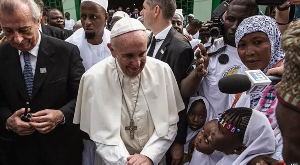LIKE Nigeria, interconnection problem is a source of worry for telecommunications operators and subscribers in Ghana. The country has about five operators with one of them offering both GSM and fixed line services. They are Ghana Telecom, the state operator which offers both GSM and fixed services; Scancom, the leading GSM operator with its Spacefone brand; Kasapa with its Kasapa brand and Milicom which has the Bass GSM phone brand. Untill recently, the brand was known as Mobitel.
However, unlike Nigeria where interconnect appears to be a web of confusion, Ghana's interconnect problem is between the National Telephone company and the GSM operators. While connection amongst the GSM operators is good, the same cannot be said of calls between the GSM networks and the Ghana Telecom network. Most of the subscribers on Ghana Telecom network find it difficult calling GSM subscribers.
But the most difficult currently is for calls between the Ghana Telecom network and Spacefone. Spacefone is the dorminant GSM network in Ghana with over 120,000 lines. It is owned principally by some Lebanese businessmen who floated Scancom in 1996 to offer analogue Mobile services. It was later upgraded to GSM around 1999 to take advantage of the Ghanaian government"s desire to bring telecommunication to its people.
Spacefone has over the months been engaged in a war of words with the Ghana Telecom over the lack of interconnect between their networks. Spacefone thinks that Ghana Telecom wants to sabotage it by refusing to open its network to it. For Ghana Telecom however, the problem is lack of interconnect pipes to accommodate the traffic from Spacefone which is the leading GSM operator in the country.
It denies any attempt at blocking traffic from Spacephone. In the face of the arguments between Ghana Telecom and Spacefone, the National Communications Authority NCA, which regulates telecommunications services in Ghana remains adamant. On several occasions, it has invited both operators to a round table but has not been able to resolve the problem. Observers say it may have decided to keep a blind eye on the problems after it has failed to resolve it. Ghana Telecom"s GSM, One Touch, is however the first choice of Ghanaian subscribers.
One Touch has perfect interconnect with the Ghana Telecom Fixed lines which are widespread all through the country. Its interconnect with other GSM operators has also improved in recent months. But like NITEL, since Ghana Telecom launched its service some three years ago, it has starved Ghanaian subscribers of its SIM cards. It launched with an 80,000 capacity network which has not been enlarged ever since.
The result is that while subscribers crave for One Touch lines, the company do not have any to sell. Today, while Spacefone sells its SIMs for about 170,000 cedis(about N3400) One Touch sells its SIMs for about 750,000 cedis (about N15,000). The third GSM operator, Bass also easily connects to other networks including Ghana Telecom. Bass has limited coverage. Its licence provides that it covers Takoradi, Cape Coast Accra and Kumasi.
It has a little over 60,000 subscribers. The fourth operator Kasapa, also has limited coverage as provided for by its licence. Its interconnect with the other operators is also good.
Kasapa is owned 80 per cent by Hutchson, an American company based in Hungary. The fixed line terrain in the Ghanaian telecom market is no doubt dominate by Ghana Telecom. But a private operator, Westel has brought some competition into this segment of the market. Westel is however hampered by its problems with the telecom regulatory authority, the NCA.
These problems are rooted in the company"s history.S Westel is an offshoot of the communications department of Ghana National Petroleum Corporation, GNPC. When Ghana"s telecommunications sector was deregulated, it dawned on the management of the GNPC that the company had a strong enough structure to run telecommunications services independent of the GNPC.
Thus, Mr Tsatsu Tsikata, who was then Chief Executive of GNPC floated Westel with a lot of American interest. But the company was not to meet the licence conditions set for it by the NCA. Part of the conditions gave it targets for subscriber volumes within the first year of its operations. Unfortunately, Westel could not meet these targets. And in accordance with the rules of the NCA, it had to pay a penalty of about $25 million.
In the past years, Westel has not been able to pay this fine which has accumulated to more than $35 million. In December last year, Westel had to negotiate the debt with the NCA and seek some waivers. The NCA granted the request and reduced the debt to $25 million. Westel paid part of this and has been unable to pay the balance in the new year.
This problem has virtually removed Westel from the competition in the fixed line market in Ghana. It as had to contend with its few subscribers to survive. But most Ghanaian subscribers say that Westel"s services are excellent. The company has good interconnectivity with all the mobile operators and even with its rival Ghana Telecom. No doubt the Ghanaian telecommunications terrain is as volatile as Nigeria's.












